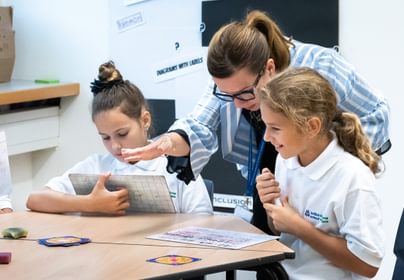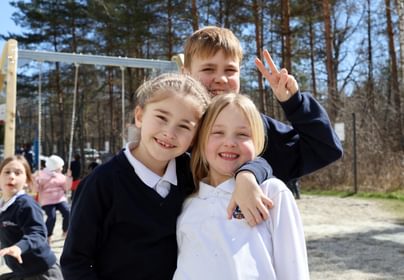Giftedness and Talent is a concept being defined in schools in terms of identification, tracking, progress and support given to students. Who is considered gifted and talented? A curious, independent student with highly developed imagination and logical thinking? A perfectionist who can solve complex tasks, is sensitive to detail and is a nonconformist? A student who follows rules and solves extension tasks on a regular basis, however does not show the motivation when not encouraged? It can be all or none of the above.
Gifted and talented students have cognitive potential and academic ability to perform significantly above the average for their year group in specific domains, explained below.
At the British International School of Ljubljana, we use CAT4 testing to determine the potential of Gifted and Talented students. CAT4s are the UK's most widely used reasoning test with over three quarters of a million students taking CAT4s each year. It assesses how students think in areas that are known to make a difference to learning. Results help teachers decide about the pace of learning that is right for a student and whether additional support or challenge is needed. Gifted and Talented students have the ability to perform at/above 120 SAS results in one or more of the areas of the test: verbal, non-verbal, quantitative and spatial. Verbal Reasoning tasks assesses a student's ability to express ideas and reason through words. It is essential to subjects with a high language content, and the most obvious skill picked up by traditional assessment. Non-verbal Reasoning tasks assess ability to problem-solve by using pictures and diagrams; skills which are important in a wide range of school subjects, including maths and science-based subjects. Spatial Reasoning tasks assess the capacity to think and draw conclusions in three dimensions, needed for many STEAM (science, technology, engineering, arts and mathematics) subjects, but not easily measured by other datasets. Quantitative Reasoning tasks assess the ability to use numerical skills to solve problems, applicable well beyond mathematics.
Gifted and talented students do not always show their ability and perform in class. They may under-achieve for a variety of reasons such as: peer pressure, behavioural issues, special educational needs or being reluctant learners. At BISL, teachers look for ‘hidden talents’ by building strong relationships with their students to be able to know and understand their learning styles as well as their personalities.
At BISL, we believe that all students, including gifted and talented students, should be challenged in order to:
- improve progress in learning, understanding and performance in academic and overall skills and knowledge,
- strengthening cross curricular links and the ability to analyse and synthesise to be able to do better decision making,
- improve independence, responsibility and reflection.
Students are challenged firstly in their classroom and secondly across the school. Teachers:
- have high expectations and standards for student work,
- differentiate by expectation, task, resource, dialogue, support and pace, as well as by targeted probing questions,
- focus on independent learning and teamwork,
- plan cross-curricular activities that challenge high performing students,
- plan homework systematically,
- work on creating a positive environment for unmotivated students to prevent underachieving, passivity etc.
In a whole-school setting, students are challenged through:
- being joined together for specific activities,
- having opportunities for special projects or gaining skills in mixed year groups as well,
- projects out of classroom for literature, poetry, science, mathematics (COBIS Poetry and Art competition, World Scholar’s Cup, Kangaroo Maths, 24 competition, Times Tables competition, MangaHigh, MyMachine project).
- being involved in the British International Music School,
- Performing Arts projects, including Dance and Drama.
Please see ourChallenge Strategies Guidance Sheet for more information.



